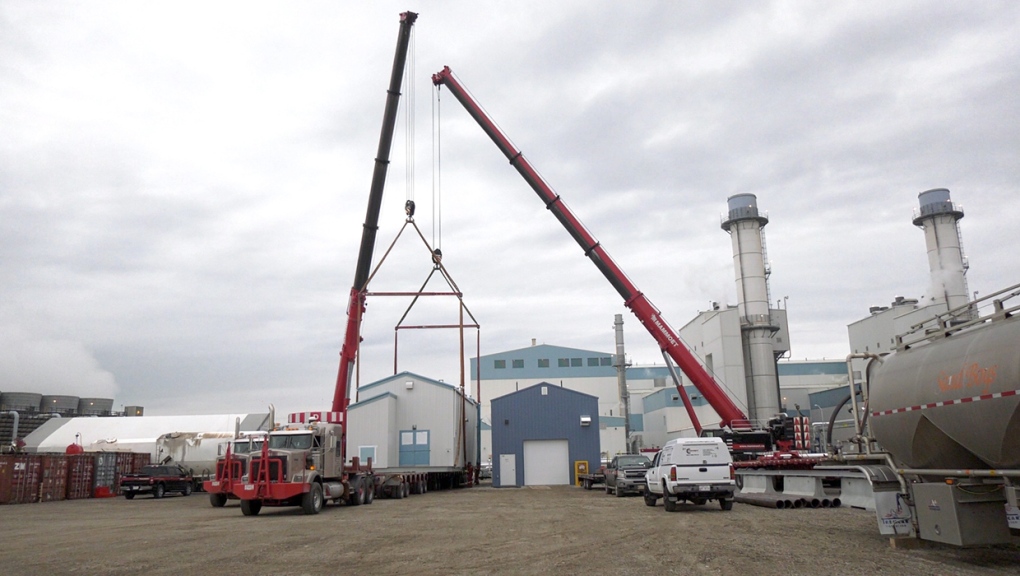Alberta prioritizes oil sands' carbon storage hub, energy minister says
 A giant carbon capture unit being lifted into place at the Shepard Energy Centre east of Calgary
A giant carbon capture unit being lifted into place at the Shepard Energy Centre east of Calgary
The government of Alberta, Canada's main oil-producing province, plans to move forward "very, very quickly" on its next carbon sequestration hub in the Cold Lake region that will serve oil sands producers, Energy Minister Sonya Savage told Reuters.
Alberta is currently accepting requests for proposals to operate an underground carbon storage hub serving the Alberta Industrial Heartland (AIH) zone near Edmonton. The process to select an operator for another hub near Cold Lake will come "on the heels" of that, Savage said in an interview late on Thursday.
"We are going to need to move on Cold Lake very, very quickly after Heartland," Savage said. "It's a hub that will give certainty to oil sands and heavy oil production."
The government is keen to move forward this year on several carbon storage hubs, where an operator will sequester both their own and third-party emissions, so industries in different areas of the provinces are not at a competitive disadvantage.
Carbon capture, utilization and storage (CCUS) is expected to be a key part of global efforts to contain emissions from fossil fuel production. It involves capturing carbon produced from heavy industrial processes like upgrading oil sands bitumen and storing it permanently underground.
"CCUS is probably my number one priority file at the moment," Savage said.
Fatih Birol, the head of the International Energy Agency, said on Thursday his organization considered CCUS to be one of the three most critical decarbonization technologies.
Alberta is aiming to aggressively expand its CCUS industry to help cut emissions and safeguard the future of its energy industry as the world aims for net-zero emissions by 2050. Savage's comments show how that plan is taking shape.
There has also been "tremendous interest" in a hub in the Grand Prairie region, where a lot of natural gas processing takes place, Savage added.
Alberta announced last year it would hold a competitive process for how it allocates underground pore space after a number of companies including Royal Dutch Shell, TC Energy and an alliance of oil sands producers proposed CCS projects.
Savage said the province received nearly 50 expressions of interest in leasing pore space rights from industries ranging from energy to petrochemicals to fertilizer production.
The government asked for formal proposals for the AIH first because they received the most interest in that area, and a number of proposals competing for the exact same underground pore space, Savage said.
Alberta plans to select the AIH sequestration hub operators by the end of March, and Savage said projects that will be up and running quickly are more likely to be successful.
"We have suggested to industry that time is of the essence, we'll be weighted more heavily towards project proposals that will be in service at an earlier date," she said.
Savage said all projects will have to go through a regulatory process, and would likely take a couple of years to start operating.
Reporting by Nia Williams Editing by Marguerita Choy
CTVNews.ca Top Stories

Minister 'outraged' after AFN national chief's headdress taken from Air Canada cabin
The federal minister of Crown-Indigenous relations is calling on Air Canada to 'make things right' with the national chief of the Assembly of First Nations, who said her headdress was removed from an airplane cabin during a flight this week.
Sophie Gregoire Trudeau on navigating post-political life, co-parenting and freedom
Sophie Gregoire Trudeau says there is 'still so much love' between her and Prime Minister Justin Trudeau, as they navigate their post-separation relationship co-parenting their three children.
'Violation': CSIS had officer investigated after she reported a superior raped her
A CSIS officer's allegations that she was raped repeatedly by a superior in agency vehicles set off a harassment inquiry, but also triggered an investigation into her that concluded the alleged attacks were a “misuse” of agency vehicles by the woman.
'Too young to have breast cancer': Rates among young Canadian women rising
Breast cancer rates are rising in Canada among women in their 20s, 30s and 40s, according to research by the University of Ottawa (uOttawa).
'I was scared': Ontario man's car repossessed after missing two repair loan payments
An Ontario man who took out a loan to pay for auto repairs said his car was repossessed after he missed two payments.
Charlie Woods, son of Tiger, shoots 81 in U.S. Open qualifier
Charlie Woods failed to advance in a U.S. Open local qualifying event Thursday, shooting a 9-over 81 at Legacy Golf & Tennis Club.
Canada recognizes housing as a human right. Few provinces have followed suit
As more Canadians find themselves struggling to afford or find housing, the country's smallest province is the only one that can point to legislation recognizing housing as a human right.
What to know about avian influenza in dairy cows and the risk to humans
Why is H5N1, or bird flu, a concern, how does it spread, and is there a vaccine? Here are the answers to some frequently asked questions about avian influenza.
Pro-plastic lobbyist presence at UN talks is 'troubling,' say advocates
Environmentalist groups are sounding the alarm about a steep increase in the number of pro-plastic lobbyists at the UN pollution talks taking place this week.































